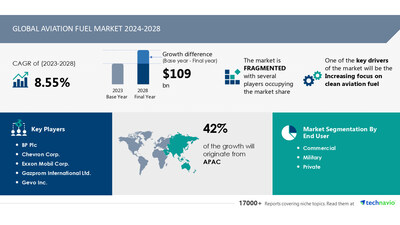NEW YORK, Sept. 9, 2024 /PRNewswire/ — Report on how AI is redefining market landscape- The global aviation fuel market size is estimated to grow by USD 109 billion from 2024-2028, according to Technavio. The market is estimated to grow at a CAGR of 8.55% during the forecast period. Increasing focus on clean aviation fuel is driving market growth, with a trend towards launch of new aviation fuel technology. However, fluctuations in oil and gas prices poses a challenge.Key market players include BP Plc, Chevron Corp., Exxon Mobil Corp., Gazprom International Ltd., Gevo Inc., Honeywell International Inc., LanzaTech Inc., Marathon Petroleum Corp., MOL Group, Neste Corp., Oil and Natural Gas Corp. Ltd., Petroleo Brasileiro SA, PJSC LUKOIL, Shell plc, SkyNRG BV, Swedish Biofuels AB, Targray Technology International Inc., TotalEnergies SE, Valero Energy Corp., and Vitol Netherlands Cooperatief UA.
AI-Powered Market Evolution Insights. Our comprehensive market report ready with the latest trends, growth opportunities, and strategic analysis- View your snapshot now
|
Forecast period |
2024-2028 |
|
Base Year |
2023 |
|
Historic Data |
2018 – 2022 |
|
Segment Covered |
End-user (Commercial, Military, and Private), Product (ATF and Aviation biofuel), and Geography (North America, APAC, Europe, South America, and Middle East and Africa) |
|
Region Covered |
North America, APAC, Europe, South America, and Middle East and Africa |
|
Key companies profiled |
BP Plc, Chevron Corp., Exxon Mobil Corp., Gazprom International Ltd., Gevo Inc., Honeywell International Inc., LanzaTech Global Inc., Marathon Petroleum Corp., MOL Group, Neste Corp., Oil and Natural Gas Corp. Ltd., Petroleo Brasileiro SA, PJSC LUKOIL, Shell plc, SkyNRG BV, Swedish Biofuels AB, Targray Technology International Inc., TotalEnergies SE, Valero Energy Corp., and Vitol Netherlands Cooperatief UA |
Key Market Trends Fueling Growth
The aviation fuel market is witnessing significant advancements with vendors introducing new technologies for producing sustainable aviation fuel (SAF). Honeywell, for instance, launched its UOP eFining technology in March 2023, enabling the production of low-carbon SAF. Additionally, in October 2022, Honeywell unveiled an innovative ethanol-to-jet fuel (ETJ) processing technology, converting ethanol into SAF. These eFuels, also known as electrofuels, are synthetic fuels that replace traditional fossil fuels. The introduction of such technology will boost the growth of the global aviation fuel market during the forecast period.
The Aviation Fuel market encompasses Aviation Turbine Fuel (ATF) and Aviation Gasoline (AvGas) used in commercial aviation, defense aviation, and general aviation. Fossil fuels dominate the market, but biofuels are gaining traction due to regulatory pressures and sustainability concerns. Technological advancements in production processes and feedstock options, such as sugarcane, corn, and algae, enhance the efficiency of biofuels. The forecast period sees investment in infrastructure for feedstock cultivation and refining facilities. Sustainability is a key trend, with advanced biofuel technologies offering scalability. Aviation fuel, used in airplanes and aircraft, faces risks of icing and environmental regulations. Aircraft manufacturers focus on efficient aircraft designs, including aerodynamic configurations and electric models, to reduce fuel consumption. Strategic mergers and operating expenses impact the customer base of conventional fuelled aircraft. Living standards and air passenger travel drive market growth, with proliferating businesses and short-distance travel expanding flying routes. The global population’s increasing demand for air travel necessitates a focus on reduced fuel costs and energy content.
Insights on how AI is driving innovation, efficiency, and market growth- Request Sample!
Market Challenges
- The aviation sector’s financial performance is closely tied to the price of crude oil. Since mid-2014, crude oil prices have remained low, leading to a supply-demand imbalance. This has negatively impacted upstream oil and gas companies, reducing their revenues and cash flow. Conversely, the downstream sector, including aviation fuel producers, experienced lower raw material costs, resulting in decreased operating expenses and increased profit margins. However, the volatility of crude oil prices poses a significant risk for airlines. A rise in crude oil prices increases aviation fuel costs, eroding profitability for the downstream sector. Conversely, low fuel prices have boosted airline profits and reduced fares, increasing demand for air travel and prompting capacity expansion. Yet, the potential for increased routes and fleet expansion could decrease profitability when oil prices recover. Furthermore, the focus on alternative aviation fuels has waned due to the low cost of traditional fuels. Airlines must carefully manage their capacity expansion to maximize profits during periods of fluctuating oil prices. These factors may hinder the growth of the global aviation fuel market during the forecast period.
- The Aviation Fuel Market faces significant challenges in the forecast period. Investment in infrastructure for producing and storing sustainable fuels, such as feedstock cultivation and refining facilities, is crucial. Sustainability is a top priority due to environmental regulations and rising customer expectations. However, the risks of icing in petrol-based fuels remain a concern for airline businesses, particularly for short-distance travel and proliferating businesses. Aircraft manufacturers are focusing on efficient aircraft designs, including aerodynamic configurations and innovative engines, to reduce fuel consumption. Strategic mergers and additives are also being used to improve operating expenses and customer base. The shift towards electric aircraft is gaining momentum, but challenges remain in terms of energy content, aircraft weight, and living standards. Conventional fuelled aircraft continue to dominate the market, but reduced fuel costs and revenue generation from air passenger travel make the industry an attractive investment opportunity. Operating expenses and aircraft production are key areas of focus for businesses, with disposable income and aircraft weight influencing revenue generation. Overall, the aviation fuel market is dynamic and complex, requiring continuous innovation and adaptation to meet the evolving needs of the airline industry.
Insights into how AI is reshaping industries and driving growth- Download a Sample Report
Segment Overview
This aviation fuel market report extensively covers market segmentation by
- End-user
- 1.1 Commercial
- 1.2 Military
- 1.3 Private
- Product
- 2.1 ATF
- 2.2 Aviation biofuel
- Geography
- 3.1 North America
- 3.2 APAC
- 3.3 Europe
- 3.4 South America
- 3.5 Middle East and Africa
1.1 Commercial- The aviation fuel market is a significant sector in the global energy industry. Aviation fuel is essential for the operation of aircraft, making it a vital commodity. The market size is substantial, with major players supplying fuel to airlines worldwide. Key players include companies like Shell, ExxonMobil, and BP. The market’s growth is driven by increasing air travel demand and fleet expansion by airlines. Regulations, such as emission norms, impact the market dynamics. Despite challenges, the aviation fuel market continues to grow, offering opportunities for investors.
Download complimentary Sample Report to gain insights into AI’s impact on market dynamics, emerging trends, and future opportunities- including forecast (2024-2028) and historic data (2018 – 2022)
Research Analysis
The Aviation Fuel Market encompasses various types of fuels, including Aviation Turbine Fuel (ATF) and Aviation Gasoline (AvGas), used in commercial aviation, defense aviation, and general aviation. Fossil fuels continue to dominate the market, but environmental regulations and concerns over greenhouse gas emissions are driving the adoption of biofuels. Regulatory bodies set standards to ensure fuel quality and safety, while risks of icing and other operational challenges present ongoing challenges. The market is proliferating with the growth of air passenger travel, short-distance travel, and flying routes. Fuel consumption is a significant operating expense for aircraft manufacturers, who are responding by producing efficient and aerodynamic aircraft. Disposable income, strategic mergers, and the emergence of electric aircraft are also shaping the market dynamics. The customer base is diverse, ranging from commercial airlines to defense forces and individual pilots. The market faces risks from conventional fueled aircraft’s reduced fuel costs and ongoing regulatory changes.
Market Research Overview
The Aviation Fuel market encompasses Aviation Turbine Fuel (ATF) and Aviation Gasoline (AvGas) used in commercial aviation, defense aviation, and general aviation. Fossil fuels, primarily petrol-based, dominate the market, but biofuels are gaining traction due to their sustainability and efficiency. Regulatory bodies are driving the shift towards biofuels to reduce carbon emissions and mitigate environmental risks. Technological advancements in production processes, feedstock options, and additives are enhancing the scalability of biofuels production. The forecast period will witness significant investment in infrastructure for feedstock cultivation and refining facilities. Sustainability concerns, strategic mergers, and operating expenses are key factors influencing market trends. The growing global population, increasing living standards, and disposable income are expanding the customer base. Advanced biofuel technologies, such as algae-based and cellulosic biofuels, are poised to revolutionize the industry. The efficiency of biofuels, reduced fuel cost, and energy content make them attractive for aircraft manufacturers producing efficient aircraft, electric aircraft, and aerodynamic aircraft. The market is also influenced by factors like fuel consumption, risks of icing, air passenger travel, proliferating businesses, short-distance travel, flying routes, and environmental regulations. The future of the Aviation Fuel market lies in innovative designs, efficient engines, and a shift towards sustainable and scalable production processes.
Table of Contents:
1 Executive Summary
2 Market Landscape
3 Market Sizing
4 Historic Market Size
5 Five Forces Analysis
6 Market Segmentation
- End-user
- Commercial
- Military
- Private
- Product
- ATF
- Aviation Biofuel
- Geography
- North America
- APAC
- Europe
- South America
- Middle East And Africa
7 Customer Landscape
8 Geographic Landscape
9 Drivers, Challenges, and Trends
10 Company Landscape
11 Company Analysis
12 Appendix
About Technavio
Technavio is a leading global technology research and advisory company. Their research and analysis focuses on emerging market trends and provides actionable insights to help businesses identify market opportunities and develop effective strategies to optimize their market positions.
With over 500 specialized analysts, Technavio’s report library consists of more than 17,000 reports and counting, covering 800 technologies, spanning across 50 countries. Their client base consists of enterprises of all sizes, including more than 100 Fortune 500 companies. This growing client base relies on Technavio’s comprehensive coverage, extensive research, and actionable market insights to identify opportunities in existing and potential markets and assess their competitive positions within changing market scenarios.
Contacts
Technavio Research
Jesse Maida
Media & Marketing Executive
US: +1 844 364 1100
UK: +44 203 893 3200
Email: media@technavio.com
Website: www.technavio.com/
![]() View original content to download multimedia:https://www.prnewswire.com/news-releases/aviation-fuel-market-to-grow-by-usd-109-billion-2024-2028-driven-by-rising-demand-for-clean-fuel-and-ais-influence-on-trends–technavio-report-302241940.html
View original content to download multimedia:https://www.prnewswire.com/news-releases/aviation-fuel-market-to-grow-by-usd-109-billion-2024-2028-driven-by-rising-demand-for-clean-fuel-and-ais-influence-on-trends–technavio-report-302241940.html
SOURCE Technavio



